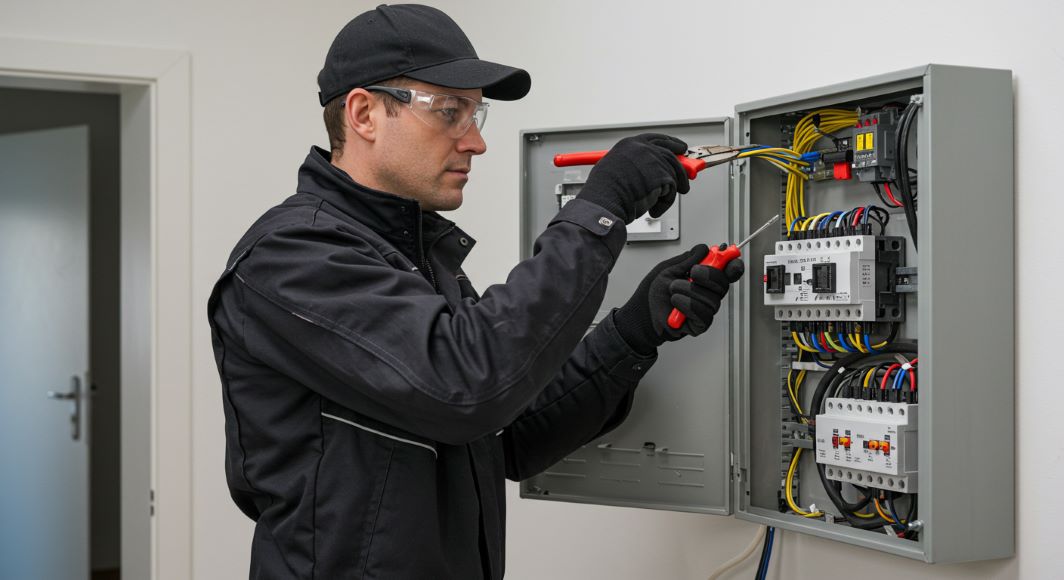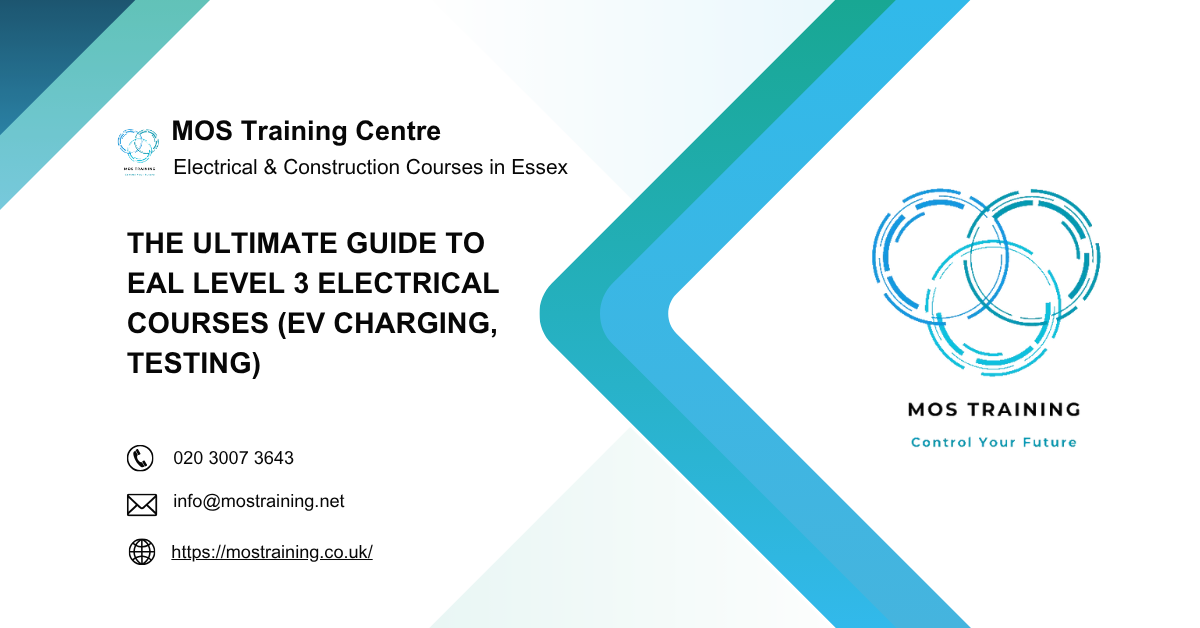Can I Do Electrician Courses On The Internet?
Yes, you can take electrician courses online in the UK. Many training providers now offer flexible learning routes that allow learners to study the theory part of electrical qualifications from home. This blended format is becoming more common, especially for those working full-time or managing other commitments.
The typical structure involves studying core subjects — like electrical principles and safety regulations — remotely, followed by practical training delivered in person at a training centre. The qualifications gained through online study routes, such as City & Guilds Level 2 and Level 3, are the same as those earned through traditional classroom-based courses. For those starting out in the trade or looking to retrain, online options provide a practical, recognised path into the electrical industry.
Here's What We Have Covered In This Article
How Online Electrician Courses Work
Online electrician courses in the UK are designed to cover all the essential theory in a way that suits remote learners. Once enrolled, students receive structured materials, textbooks, and access to an online platform where lessons and assignments are managed. These platforms often include interactive elements such as progress trackers, quizzes, and tutor support.
Students are encouraged to study at their own pace, building a solid understanding of topics such as electrical science, wiring systems, and safety procedures. The course is usually split into two phases: the theory, which is completed at home, and the practical, which is scheduled once the learner is ready. This format ensures that candidates are well prepared before beginning hands-on work in a workshop or training centre.
What’s Included in a Home Study Pack
Most reputable UK training centres that offer online electrician courses will provide a comprehensive home study pack upon registration. These packs typically include:
City & Guilds-endorsed textbooks matched to the qualification level
A structured study guide to follow throughout the course
Example test papers and self-assessment tools
Access credentials for online learning platforms
Support contact details for qualified tutors
The materials are designed to provide learners with everything they need to master the theory elements of the qualification. Some providers also include mock tests and knowledge checks to help students track their progress and focus on areas that need more attention before sitting the final exams.
Learning Theory at Home
Studying from home offers flexibility, but it also requires discipline. Most providers recommend a minimum of six weeks of study before booking the practical training, although some learners may progress faster or slower depending on their availability and prior knowledge.
Online platforms used in UK electrician training courses are generally user-friendly and designed with the learner in mind. They allow students to work through lessons, complete activities, and review difficult topics as often as needed. With a structured plan, clear materials, and access to tutor support, learning the theory side of electrical training from home is entirely manageable — and increasingly popular across the UK.
How Long Does Home Study Take?
For most electrician courses offered in a home study format, learners are advised to spend at least six weeks working through the theory before moving on to the practical training. This timeline can vary depending on how much time a student has available each week, but six to eight weeks is a realistic estimate for steady progress.
Some learners choose to study part-time in the evenings or at weekends, while others take a more intensive approach. The flexibility allows each person to go at their own pace, but the key is consistency. It’s important to have a good grasp of the theory before booking the in-person training, as it forms the foundation for the hands-on work that follows.
When Do I Do the Practical Training?
Once the home study section is complete and the learner feels confident with the material, the next step is to attend a training centre for the practical part of the course. This is where theory meets real-world application.
Most training centres in the UK ask students to get in touch once they’ve completed their theory modules, so they can schedule the in-centre sessions. These are usually delivered in blocks over a number of days or weeks, depending on the course level. During this phase, students learn to carry out installations, fault finding, testing, and other core tasks under supervision.
Where Does the Practical Training Take Place?
Practical electrician training is carried out at approved centres across the UK. These facilities are purpose-built to replicate real working conditions and are fully equipped with everything needed — from training boards and consumer units to hand tools and safety gear.
Centres vary in size and layout, but most will have dedicated training bays where students can work on individual tasks. Instructors are typically qualified electricians with hands-on industry experience. They guide students through each exercise, providing support and feedback to help develop the practical skills needed for the job.
What You Learn from an Electrician Course
Electrician courses, whether taken online or in person, are designed to teach both the theoretical knowledge and practical abilities needed to work safely and competently in the electrical industry. By the end of the course, students should be able to:
-
Understand how electrical systems work
-
Apply key regulations, such as wiring rules and health and safety standards
-
Install and maintain domestic or commercial electrical systems
-
Use tools and equipment safely and effectively
-
Identify and fix faults in wiring or installations
-
Follow building regulations and industry best practices
Most courses also include training on how the electrical industry is structured in the UK, including how qualifications are recognised and how to progress in the trade.
Qualifications You’ll Get from Online Courses
Most online electrician courses in the UK lead to qualifications recognised across the industry. These typically include City & Guilds Level 2 and Level 3 Diplomas in Electrical Installation, which are standard starting points for anyone entering the trade. The format of the course — online theory followed by practical training — doesn’t affect the outcome. The qualifications are exactly the same as those awarded through full-time classroom courses.
Upon successful completion, students receive certificates issued by City & Guilds or another accredited awarding body. These qualifications are accepted by employers, trade bodies, and further education providers, making them a valid route into employment or further progression within the industry.
Why Choose a Home Study Electrician Course?
Home study courses offer flexibility that’s hard to match with full-time in-centre programmes. Whether you’re working, raising a family, or changing careers, being able to study the theory at home gives you control over your schedule. You set the pace and decide when you’re ready to move on to the practical training.
Many people also find home study more affordable. Without the daily travel or need to attend classes at set times, the overall cost — both in money and time — can be lower. It’s a practical, efficient option for anyone serious about gaining a recognised qualification without putting life on hold.
Can Beginners Take Online Electrician Courses?
Yes, beginners can absolutely start with an online electrician course. These programmes are designed to support learners with no prior experience. All the theory is explained clearly, and materials are structured in a way that builds understanding step by step.
Courses often start with the basics — such as electrical safety, wiring principles, and simple installations — before progressing to more advanced topics. Whether you’ve recently left school or you’re retraining after years in another field, the course structure makes it easy to follow along and gain the skills needed to move forward.
Did You Know?
-
High Demand for Electricians: The UK faces a significant shortage of skilled electricians, with the construction sector requiring thousands more to meet housing and infrastructure goals. The Times
-
Competitive Salaries: Qualified electricians in the UK earn an average annual salary of £36,414, reflecting the strong demand for their skills. Talent.com











